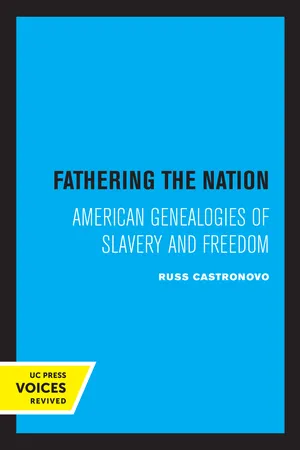
- 296 pages
- English
- ePUB (mobile friendly)
- Available on iOS & Android
About This Book
Russ Castronovo underscores the inherent contradictions between America's founding principles of freedom and the reality of slavery in a book that probes mid-nineteenth-century representations of the founding fathers. He finds that rather than being coherent and consensual, narratives of nationhood are inconsistent, ambivalent, and ironic. He examines competing expressions of national memory in a wide range of mid-nineteenth-century artifacts: slave autobiography, classic American fiction, monumental architecture, myths of the Revolution, proslavery writing, and landscape painting.Castronovo theorizes a new American cultural studies which takes into consideration what Toni Morrison calls the "Africanist presence" that permeates American literature. He presents a genealogy that recovers those members of the national family whose status challenges the body politic and its history. The forgotten orphans in Melville's Moby-Dick and Israel Potter, the rebellious slaves in the work of Frederick Douglass and William Wells Brown, the citizens afflicted with amnesia in Lincoln's speeches, and the dispossessed sons in slave narratives all provide dissenting voices that provoke insurrectionary plots and counter-memories. Viewed here as a miscegenation of stories, the narrative of "America" resists being told of an intelligible story of uncontested descent. National identity rests not on rituals of consensus but on repressed legacies of parricide and rebellion.This title is part of UC Press's Voices Revived program, which commemorates University of California Press's mission to seek out and cultivate the brightest minds and give them voice, reach, and impact. Drawing on a backlist dating to 1893, Voices Revived makes high-quality, peer-reviewed scholarship accessible once again using print-on-demand technology. This title was originally published in 1995.
Frequently asked questions
Information
Table of contents
- Cover
- Title
- Copyright
- Contents
- Illustrations
- Acknowledgments
- “Adding Story to Story" An Introduction to Parricide and Genealogy
- Founding Fathers and Parricidal Textuality Race and Authority in American Narrative
- Covenants, Truth, and the “Ruthless Democracy" of Moby-Dick
- 3 Monumental Culture
- 4 Monuments, Fathers, Slaves
- Discursive Passing and African American Literature
- Notes
- Works Cited
- Index